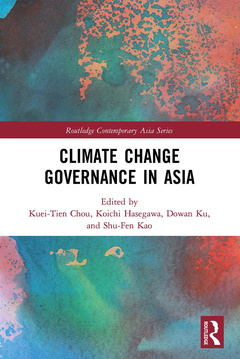Climate Change Governance in Asia Routledge Contemporary Asia Series

Asian countries are among the largest contributors to climate change. China, India, Japan and South Korea are among the top ten largest carbon emitters in the world, with South Korea, Japan and Taiwan also some of the largest on a per capita basis. At the same time, many Asian countries, notably India, Taiwan, Japan, the Philippines and Thailand are among those most affected by climate change, in terms of economic losses attributed to climate-related disasters.
Asia is an extremely diverse region, in terms of the political regimes of its constituent countries, and of their level of development and the nature of their civil societies. As such, its countries are producing a wide range of governance approaches to climate change. Covering the diversity of climate change governance in Asia, this book presents cosmopolitan governance from the perspective of urban and rural communities, local and central governments, state-society relations and international relations. In doing so it offers both a valuable overview of individual Asian countries? approaches to climate change governance, and a series of case studies for finding solutions to climate change challenges.
List of figures
List of tables
List of contributors
- Introduction
- Koichi Hasegawa
- Kuei-Tien Chou and Hwa Meei Liou
- Sun-Jin Yun
- Kang Chen and Alex Y Lo
- Chaya Vaddhanaphuti
- Midori Aoyagi
- Chia-Wei Chao and Kuei-Tien Chou
- Hajime Kimura
- So-Young Lee, Eric Zusman and Seejae Lee
- Anshu Ogra
- Leah Abayao
- Roger S. Chen and Ho-Ching Lee
Part I
Framework of Climate Change Governance in Asian Countries
Climate Change Governance in Japan: Critical Review on Japan's INDC and its Energy Policy
Climate Change Governance in Taiwan: The Transitional Gridlock by a High Carbon Regime
Climate Change Governance in Korea: Focusing on the Process of the Establishment of its NDC
Climate Governance in China: the role of International Organisations in the Guangdong Emission Trading Scheme
Part II
Risks and Transition
Governing Climate Knowledges: what can Thailand Climate Change Master Plan and climate project managers learn from lay Northern Thai villagers?
Risk Perceptions and Attitudes Toward National Energy Choices and Climate Change in Japan and European Countries
Governing the Climate-Driven Systemic Risk in Taiwan – Challenges and Perspectives
Ecological Modernization, New Technologies and Framing in the Environmental Movement: A climate Change Mitigation Technology (CO2 capture and storage) and its Environmental Risk
Part III
Local Governance on Climate Change Adaptation
Tracing Sustainability Transitions in Seoul Governance: Enabling and Scaling Grassroots Innovations
Rethinking Adaptation to Climate Change in the Policy Landscape of India
Disaster Risk Governance in Northern Philippines Communities: Issues and Prospects in Climate Change Talks
Assessing Climate Governance of Tainan City through Stakeholder Networks and Text Mining
Index
Kuei-Tien Chou is Professor at the Graduate Institute of National Development, National Taiwan University and Lead Principal Investigator of Risk Society and Policy Research Center, National Taiwan University.
Koichi Hasegawa is Professor of Sociology at Graduate School of Arts and Letters, Tohoku University, Japan.
Dowan Ku is Director of Environment and Society Research Institute, Seoul, South Korea.
Shu-Fen Kao is Associate Professor at the Department of Sociology, Fo Guang University.
Date de parution : 04-2022
15.6x23.4 cm
Date de parution : 07-2020
15.6x23.4 cm
Thèmes de Climate Change Governance in Asia :
Mots-clés :
Climate Change; Climate Governance; China; Energy Policies; Thailand; Civil Society; Guangdong; Minister Of The Environment; Governance; Climate Change Governance; Taiwan; Paris Agreement; Philippines; Ecological Modernization; South Korea; CCS Technology; Japan; High Carbon Societies; India; Carbon Emission Reduction Target; Environment; Local Knowledge; Climate Knowledge; Air Pollution; Pilot ETS; Sustainability; INDC; state-society relations; Reflexive Governance; carbon emitters; Fukushima Nuclear Accident; Basic Energy Plan; Asian countries; DRR; political regimes; Climate Change Mitigation Technologies; Mayor Park; CCS Development; Tamil Nadu; Chinese Government; CCS Project



